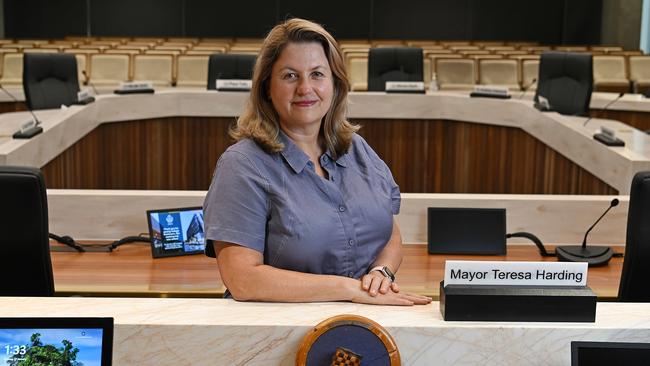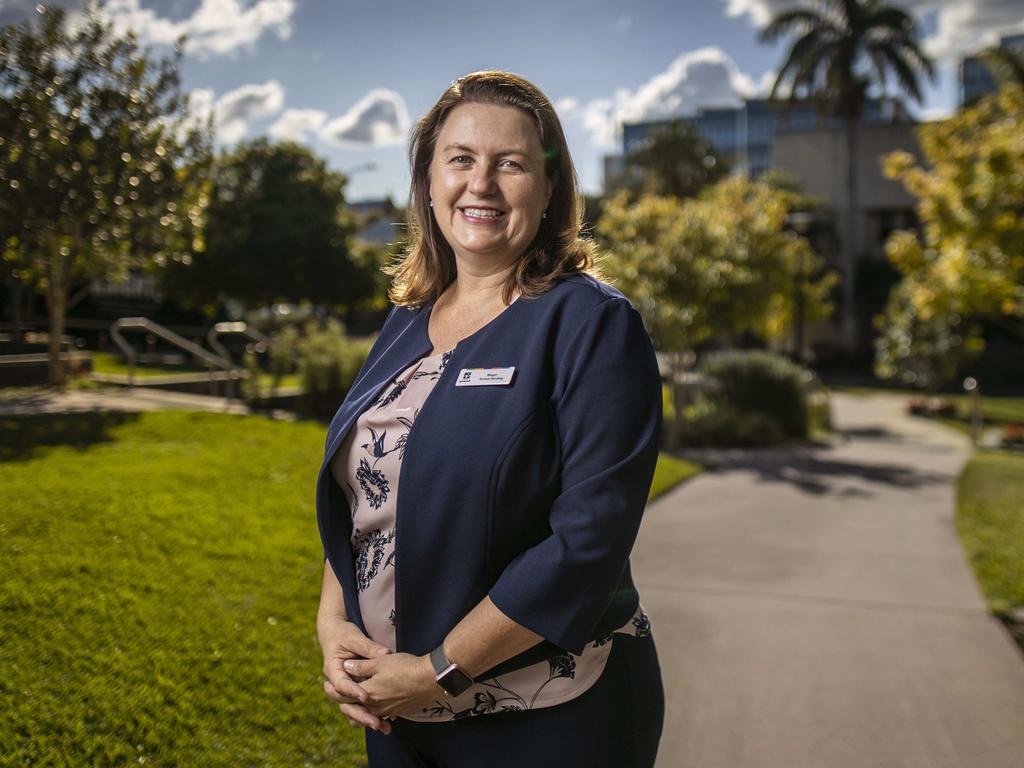Ipswich mayor Teresa Harding fights gag on her from speaking to the media
Ipswich mayor Teresa Harding has twice being popularly elected by her city, but now says her rivals are trying to gag her.

The popularly elected mayor of Ipswich, heading one of Australia’s largest councils, will be gagged from speaking with the media or issuing press releases on major city issues in a vote being championed by her political rivals and expected to be passed this week.
Teresa Harding, directly elected to her second term as mayor in 2024, has accused a block of councillors of undermining her position in retaliation to criticism of “integrity failures” that previously existed in the running of the city, and which led to the entire council being sacked by the then Labor state government in 2018.
Three current councillors, including veteran Paul Tully – who is pushing the proposed changes to the council’s media policies – lost their jobs when the council was sacked after two mayors and several city officials were charged.
Longtime Ipswich mayor Paul Pisasale was convicted and jailed for corruption, with his successor Andrew Antoniolli charged with seven counts of fraud, of which he was later convicted and then acquitted on appeal.
Six of the nine city councillors, including Mr Tully and Mr Antoniolli, used a vote soon after the local government elections in March 2024 to remove the mayor as chair of the Local Disaster Management Group for the city that has faced a succession of major flooding events. She is one of the few mayors in Queensland not to head the local council’s disaster management group.
In 2022, Mr Tully faced public criticism when he received the support of three councillors to overturn a decision of Ms Harding to rename a bridge that had been named in honour of Mr Pisasale.
The councillors eventually backed down and the bridge was renamed.
Ms Harding said she now expected the changes to the media rules, which was originally scheduled to be reviewed in August 2026, to be passed in a vote on Tuesday.
She said she was unaware of any example in Queensland politics where a mayor had been restricted by another councillor from speaking to their community on behalf of council.
“This is an extraordinary political attack aimed at gagging a mayor from representing the council and community they were democratically elected to lead,” she said.
“This motion would effectively remove me from any media statement or response to a media inquiry that relates to the decisions or business of Ipswich City Council. While I would continue to be able to make media comments in my own capacity, this motion would gag me from speaking on behalf of council.
“What we are seeing here is a motion designed to strip me of my role of representing council and the Ipswich community in the media, and a blatant abuse of the powers entrusted to councillors.”
Under the current council media rules, the mayor is the designated “lead spokesperson on major matters”.
But according to the draft changes, the mayor's role is now subject to a new provision that states the chair of a relevant committee will be the designated spokesperson where “council media releases arise from or relate to a committee or committee portfolio or to a council agenda item or other matter or as a result of a media inquiry”.
Ms Harding chairs just one sub-committee, the Advocacy Advisory Committee. Other committees cover planning, economic development, finance, governance, environment, sports and community.
Mr Tully denied he was trying to gag the mayor, saying the proposed changes were intended to clarify the role of committee chairs in talking to the media.
“It just makes it clear what the position has been for the last four decades,’’ he said.
“It makes sense that the lead spokesperson is the committee chair because they’re the ones that are presenting the reports and recommendations to the council.
“What’s she is saying is an exaggeration, a misrepresentation of the motion.
“She is free to speak on issues, on any matter.”
Griffith University associate professor in politics Paul Williams said the changes did not seem “to pass the pub test”.
Dr Williams said that in state and federal governments the leader was able to discuss issues across all cabinet portfolios under the conventions of the Westminster system, which did not theoretically apply to councils.
He said while “decentralisation of power” was generally positive, Australians expected their leaders to “speak on any matter”.
“Australians like popularly elected leaders, and they want them to be strong and vocal leaders,’’ he said.
“They would see restrictions as a lot of red tape that is mumbo jumbo, and that a mayor should have capacity to speak on anything in their city.’’





To join the conversation, please log in. Don't have an account? Register
Join the conversation, you are commenting as Logout